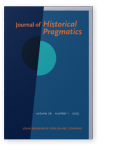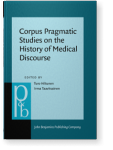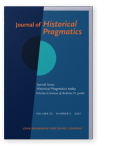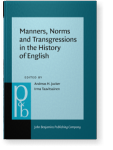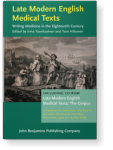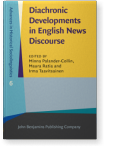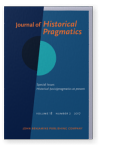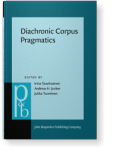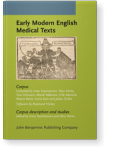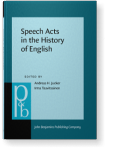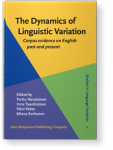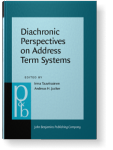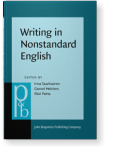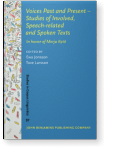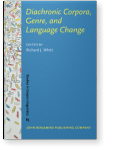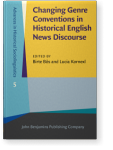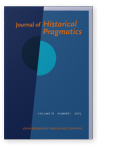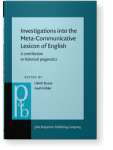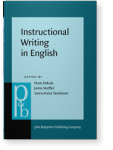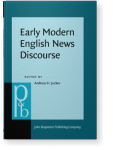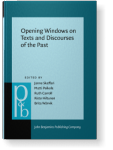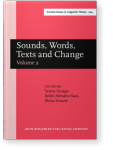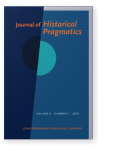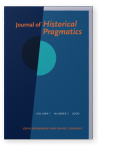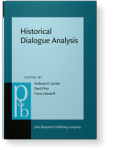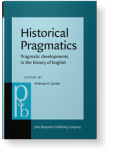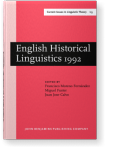Irma Taavitsainen
List of John Benjamins publications for which Irma Taavitsainen plays a role.
Journal
Corpus Pragmatic Studies on the History of Medical Discourse
Edited by Turo Hiltunen and Irma Taavitsainen
[Pragmatics & Beyond New Series, 330] 2022. vii, 322 pp.
Subjects Corpus linguistics | Discourse studies | Historical linguistics | Pragmatics
Historical Pragmatics today: Articles in honour of Andreas H. Jucker
Edited by Irma Taavitsainen and Jonathan Culpeper
Special issue of Journal of Historical Pragmatics 22:2 (2021) v, 143 pp.
Subjects Discourse studies | Historical linguistics | Pragmatics
Manners, Norms and Transgressions in the History of English: Literary and linguistic approaches
Edited by Andreas H. Jucker and Irma Taavitsainen
[Pragmatics & Beyond New Series, 312] 2020. viii, 298 pp.
Subjects Discourse studies | English linguistics | English literature & literary studies | Historical linguistics | Pragmatics
Late Modern English Medical Texts: Writing medicine in the eighteenth century. Including the LMEMT Corpus
Edited by Irma Taavitsainen and Turo Hiltunen
[Not in series, 221] 2019. xix, 432 pp., incl. CD-RoM
Subjects Discourse studies | English linguistics | Historical linguistics | Pragmatics | Sociolinguistics and Dialectology
Diachronic Developments in English News Discourse
Edited by Minna Palander-Collin, Maura Ratia and Irma Taavitsainen
[Advances in Historical Sociolinguistics, 6] 2017. vii, 301 pp.
Subjects Communication Studies | Discourse studies | English linguistics | Germanic linguistics | Historical linguistics | Pragmatics
Historical (socio)pragmatics at present
Edited by Matylda Włodarczyk and Irma Taavitsainen
Special issue of Journal of Historical Pragmatics 18:2 (2017) v, 180 pp.
Subjects Discourse studies | Historical linguistics | Pragmatics
Diachronic Corpus Pragmatics
Edited by Irma Taavitsainen, Andreas H. Jucker and Jukka Tuominen
[Pragmatics & Beyond New Series, 243] 2014. viii, 335 pp.
Subjects Corpus linguistics | Historical linguistics | Pragmatics | Theoretical linguistics
Early Modern English Medical Texts: Corpus description and studies
Edited by Irma Taavitsainen and Päivi Pahta
[Not in series, 160] 2010. xv, 370 pp. (incl. CD-Rom)
Subjects Corpus linguistics | Discourse studies | Electronic/Multimedia Products | English linguistics | Historical linguistics | Pragmatics
Speech Acts in the History of English
Edited by Andreas H. Jucker and Irma Taavitsainen
[Pragmatics & Beyond New Series, 176] 2008. viii, 318 pp.
Subjects Discourse studies | English linguistics | Germanic linguistics | Historical linguistics | Pragmatics
The Dynamics of Linguistic Variation: Corpus evidence on English past and present
Edited by Terttu Nevalainen, Irma Taavitsainen, Päivi Pahta and Minna Korhonen
[Studies in Language Variation, 2] 2008. viii, 339 pp.
Subjects Corpus linguistics | English linguistics | Germanic linguistics | Historical linguistics | Sociolinguistics and Dialectology | Theoretical linguistics
Middle English Medical Texts
Compiled by Irma Taavitsainen, Päivi Pahta and Martti Mäkinen
[Not in series, 131] 2005. CD-ROM
Subjects Corpus linguistics | Electronic/Multimedia Products | English linguistics | Germanic linguistics | Historical linguistics
Diachronic Perspectives on Address Term Systems
Edited by Irma Taavitsainen and Andreas H. Jucker
[Pragmatics & Beyond New Series, 107] 2003. vii, 441 pp.
Subjects Discourse studies | Historical linguistics | Pragmatics
Writing in Nonstandard English
Edited by Irma Taavitsainen, Gunnel Melchers and Päivi Pahta
[Pragmatics & Beyond New Series, 67] 2000. viii, 403 pp.
Subjects Discourse studies | English linguistics | English literature & literary studies | Germanic linguistics | Pragmatics | Writing and literacy
2022 Chapter 1. Corpora, pragmatics, and historical medical discourse Corpus Pragmatic Studies on the History of Medical Discourse, Hiltunen, Turo and Irma Taavitsainen (eds.), pp. 1–20 | Chapter
2021 Medical book reviews 1665–1800: From compliments to insults Historical Pragmatics today: Articles in honour of Andreas H. Jucker, Taavitsainen, Irma and Jonathan Culpeper (eds.), pp. 245–262 | Article
This article traces medical book reviews up to 1800 in the first scientific periodical, The Philosophical Transactions (pt 1665–), and the first general magazine, The Gentleman’s Magazine (gm 1665–1922), within the frame of genre theory, focusing on polite and impolite speech acts. pt readers… read more
2021 Introduction Historical Pragmatics today: Articles in honour of Andreas H. Jucker, Taavitsainen, Irma and Jonathan Culpeper (eds.), pp. 161–163 | Introduction
2020 Chapter 6. Interjections in early popular literature: Stereotypes and innovation Voices Past and Present - Studies of Involved, Speech-related and Spoken Texts: In honor of Merja Kytö, Jonsson, Ewa and Tove Larsson (eds.), pp. 79–94 | Chapter
Early modern jests and drama provide excellent materials for studies on speech-based language. This article focuses on a core group of interjections, alas, lo and O, and assesses their use from a diachronic perspective. The method of study is qualitative stylistic analysis and the data comes… read more
2020 A medical debate of “heated pamphleteering” in the early eighteenth century Manners, Norms and Transgressions in the History of English: Literary and linguistic approaches, Jucker, Andreas H. and Irma Taavitsainen (eds.), pp. 141–163 | Chapter
This chapter probes into the controversy of smallpox inoculation that followed soon after the novel method was introduced into England and culminated in the second decade of the eighteenth century. Polemical argumentation displays verbal aggression, and irony and sarcasm take the upper hand in… read more
2020 Manners, norms and transgressions: Introduction Manners, Norms and Transgressions in the History of English: Literary and linguistic approaches, Jucker, Andreas H. and Irma Taavitsainen (eds.), pp. 1–23 | Chapter
In this volume we focus on different types of manners, norms and their transgressions. One kind of transgression can be called “blunders” and deals with violations of accepted behaviour, conduct or manners. A second kind draws more attention to language use in interpersonal communication with… read more
2019 Chapter 1. Towards new knowledge: The corpus of Late Modern English Medical Texts Late Modern English Medical Texts: Writing medicine in the eighteenth century, Taavitsainen, Irma and Turo Hiltunen (eds.), pp. 1–16 | Chapter
Late Modern English Medical Texts (LMEMT) is a new corpus representing printed medical writing in the eighteenth century. This chapter describes the structure and the main compilation principles of the corpus. Representativeness is a complex notion in corpus linguistics in general,… read more
2019 Chapter 5. Medical case reports in Late Modern English Late Modern English Medical Texts: Writing medicine in the eighteenth century, Taavitsainen, Irma and Turo Hiltunen (eds.), pp. 89–112 | Chapter
This chapter shifts the focus to the patients, using discourse analysis. The medical case report is a narrative of a single case of disease or injury and it is one of the genres that have continuity throughout the history of English medical writing from the late medieval period to the present.… read more
2019 11.3. Medical recipe collections Late Modern English Medical Texts: Writing medicine in the eighteenth century, Taavitsainen, Irma and Turo Hiltunen (eds.), pp. 279–288 | Miscellaneous
2019 11.2b. Methods Late Modern English Medical Texts: Writing medicine in the eighteenth century, Taavitsainen, Irma and Turo Hiltunen (eds.), pp. 251–260 | Miscellaneous
2019 11.2c. Therapeutic substances Late Modern English Medical Texts: Writing medicine in the eighteenth century, Taavitsainen, Irma and Turo Hiltunen (eds.), pp. 261–270 | Miscellaneous
2019 Chapter 9. Professional and lay medical texts in the eighteenth century: A linguistic stylistic assessment Late Modern English Medical Texts: Writing medicine in the eighteenth century, Taavitsainen, Irma and Turo Hiltunen (eds.), pp. 173–198 | Chapter
This study focuses on stylistic features in medical texts for different audiences in various channels of publication. My aim is to explore whether there are differences between medical writings for professional and lay audiences. Authors mostly belonged to educated professionals who wrote for their… read more
2019 11.8. General periodical: The Gentleman’s Magazine Late Modern English Medical Texts: Writing medicine in the eighteenth century, Taavitsainen, Irma and Turo Hiltunen (eds.), pp. 327–336 | Miscellaneous
2019 11.1. General treatises and textbooks Late Modern English Medical Texts: Writing medicine in the eighteenth century, Taavitsainen, Irma and Turo Hiltunen (eds.), pp. 231–238 | Miscellaneous
2019 Chapter 7. Polite society language practices: Letters to the Editor in The Gentleman’s Magazine Late Modern English Medical Texts: Writing medicine in the eighteenth century, Taavitsainen, Irma and Turo Hiltunen (eds.), pp. 129–144 | Chapter
This chapter presents a pragmatic study on polite society language practices. Politeness, sociability, and concern for public good have been pointed out as values underpinning the late eighteenth-century culture among gentility, and it was important to recognize one’s own position in relation to… read more
2019 Chapter 3. Topics of eighteenth-century medical writing with triangulation of methods: LMEMT and the underlying reality Late Modern English Medical Texts: Writing medicine in the eighteenth century, Taavitsainen, Irma and Turo Hiltunen (eds.), pp. 31–74 | Chapter
This chapter deals with the most important developments within society and the medical discourse community in the eighteenth-century Britain. It applies several methods by way of triangulation to probe into relevant aspects of the history of medicine and medical writing between 1700 and 1800. The… read more
2019 Chapter 2. Sociohistorical and cultural context of Late Modern English Medical Texts Late Modern English Medical Texts: Writing medicine in the eighteenth century, Taavitsainen, Irma and Turo Hiltunen (eds.), pp. 17–30 | Chapter
The eighteenth century presents as a transition period towards more modern practices in medical history. In this chapter we probe into these developments as reflected in medical writing and provide a sociohistorical overview of the background for the corpus. When compared to the earlier phases of… read more
2018 Scholastic genre scripts in English medical writing 1375–1800 Diachronic Corpora, Genre, and Language Change, Whitt, Richard J. (ed.), pp. 95–116 | Chapter
Late medieval scientific and medical writing had several different genres and levels of writing from the beginning. Learned genres, including commentaries, were introduced into English with the vernacularization boom. The Latin “genre script” lists ancient authorities’ opinions of a topic,… read more
2017 Chapter 1. English news discourse from newsbooks to new media Diachronic Developments in English News Discourse, Palander-Collin, Minna, Maura Ratia and Irma Taavitsainen (eds.), pp. 3–12 | Chapter
This chapter discusses the long diachrony of English news discourse from seventeenth-century newsbooks to the twentieth century and the dawn of multimedia. We shall place news discourse in its context of sociocultural developments considering what might be diachronically constant and what prone to… read more
2017 Chapter 5. A modest proposal in The Gentleman’s Magazine: A peculiar eighteenth-century advertisement Diachronic Developments in English News Discourse, Palander-Collin, Minna, Maura Ratia and Irma Taavitsainen (eds.), pp. 81–96 | Chapter
The Gentleman’s Magazine (GM, 1732–1922) was the first periodical magazine targeted at an educated lay readership from polite society. Medical items and related issues were a regular feature, e.g. suicide was a recurring topic in its early years. One example of this was a 1755 mock advertisement… read more
2017 Meaning-making practices in the history of medical English: A sociopragmatic approach Historical (socio)pragmatics at present, Włodarczyk, Matylda and Irma Taavitsainen (eds.), pp. 252–270 | Article
Genres work through conventions of communicative patterns. Variation in them is related to sociolinguistic parameters of writers and readers as well as situational and contextual factors, including culture. Conventions of writing change slowly and there are elements that remain constant… read more
2017 Introduction: Historical (socio)pragmatics at present Historical (socio)pragmatics at present, Włodarczyk, Matylda and Irma Taavitsainen (eds.), pp. 159–174 | Introduction
This introductory paper defines the present state of the art of historical (socio)pragmatics. We single out interactional and social foci as the most important, and we briefly characterise some more narrowly defined perspectives. These involve a politeness-related view that relies on relational… read more
2015 Medical news in England 1665–1800 in journals for professional and lay audiences Changing Genre Conventions in Historical English News Discourse, Bös, Birte and Lucia Kornexl (eds.), pp. 135–160 | Article
This article is based on three early periodicals: The Philosophical Transactions
for the Royal Society (PT, 1665–), The Edinburgh Medical Journal (EMJ, 1733–),
and The Gentleman’s Magazine (GM, 1731–). A broad and inclusive selection
of unexplored texts comes from a period in which conventions of… read more
2015 Twenty years of historical pragmatics: Origins, developments and changing thought styles Journal of Historical Pragmatics 16:1, pp. 1–24 | Article
This paper provides an outline of the changes in linguistics that gave rise to historical pragmatics in the 1990s and that have shaped its development over the twenty years of its existence. These changes have affected virtually all aspects of linguistic analyses: the nature of the data, the… read more
2014 Complimenting in the history of American English: A metacommunicative expression analysis Diachronic Corpus Pragmatics, Taavitsainen, Irma, Andreas H. Jucker and Jukka Tuominen (eds.), pp. 257–276 | Article
Speech acts are functional entities and can, therefore, not be searched for directly in large computerised corpora. They can only be located on the basis of specific patterns that are known to be typical for a particular speech act, e.g. with IFIDs like “(I’m) sorry”. In this contribution we… read more
2014 Diachronic corpus pragmatics: Intersections and interactions Diachronic Corpus Pragmatics, Taavitsainen, Irma, Andreas H. Jucker and Jukka Tuominen (eds.), pp. 3–26 | Article
2012 Now as a text deictic feature in Late Medieval and Early Modern English medical writing Investigations into the Meta-Communicative Lexicon of English: A contribution to historical pragmatics, Busse, Ulrich and Axel Hübler (eds.), pp. 179–206 | Article
2010 Introducing Early Modern English Medical Texts Early Modern English Medical Texts: Corpus description and studies, Taavitsainen, Irma and Päivi Pahta (eds.), pp. 1–8 | Article
2010 Expanding the borders of knowledge Early Modern English Medical Texts: Corpus description and studies, Taavitsainen, Irma and Päivi Pahta (eds.), pp. 11–12 | Article
“What a piece of work is a man! how noble in Reason! how infinite in faculty” (Shakespeare, Hamlet, 1623: 263)
read more2010 Discourse and genre dynamics in early modern english medical writing Early Modern English Medical Texts: Corpus description and studies, Taavitsainen, Irma and Päivi Pahta (eds.), pp. 29–54 | Article
2010 Appendix: Medicine in society Early Modern English Medical Texts: Corpus description and studies, Taavitsainen, Irma and Päivi Pahta (eds.), pp. 133–146 | Appendix
2010 Category 1: General treatises and textbooks Early Modern English Medical Texts: Corpus description and studies, Taavitsainen, Irma and Päivi Pahta (eds.), pp. 65–72 | Article
2010 The field of medical writing with fuzzy edges Early Modern English Medical Texts: Corpus description and studies, Taavitsainen, Irma and Päivi Pahta (eds.), pp. 57–62 | Article
2009 Authority and instruction in two sixteenth-century medical dialogues Instructional Writing in English: Studies in honour of Risto Hiltunen, Peikola, Matti, Janne Skaffari and Sanna-Kaisa Tanskanen (eds.), pp. 105–124 | Article
2009 “Joyful News out of the Newfound World”: Medical and scientific news reports in Early Modern England Early Modern English News Discourse: Newspapers, pamphlets and scientific news discourse, Jucker, Andreas H. (ed.), pp. 189–204 | Article
2008 Apologies in the history of English: Routinized and lexicalized expressions of responsibility and regret Speech Acts in the History of English, Jucker, Andreas H. and Irma Taavitsainen (eds.), pp. 229–244 | Article
2008 Fishing for compliments: Precision and recall in corpus-linguistic compliment research Speech Acts in the History of English, Jucker, Andreas H. and Irma Taavitsainen (eds.), pp. 273–294 | Article
2008 Exploring the dynamics of linguistic variation through public and private corpora The Dynamics of Linguistic Variation: Corpus evidence on English past and present, Nevalainen, Terttu, Irma Taavitsainen, Päivi Pahta and Minna Korhonen (eds.), pp. 1–9 | Article
2008 "Methinks you seem more beautiful than ever": Compliments and gender in the history of English Speech Acts in the History of English, Jucker, Andreas H. and Irma Taavitsainen (eds.), pp. 195–228 | Article
2008 Speech acts now and then: Towards a pragmatic history of English Speech Acts in the History of English, Jucker, Andreas H. and Irma Taavitsainen (eds.), pp. 1–23 | Article
2005 Genres and the appropriation of science: Loci communes in English in the late medieval and early modern period Opening Windows on Texts and Discourses of the Past, Skaffari, Janne, Matti Peikola, Ruth Carroll, Risto Hiltunen and Brita Wårvik (eds.), pp. 179–196 | Article
According to the theory of appropriation, the same text can be perceived in different ways by different audiences. There are no stable meanings, but significations are constructed in different ways according to the competence of the audience. This article sets out to explore whether and how… read more
2003 1. Diachronic perspectives on address term systems: Introduction Diachronic Perspectives on Address Term Systems, Taavitsainen, Irma and Andreas H. Jucker (eds.), pp. 1–25 | Article
2002 Historical discourse analysis: Scientific language and changing thought-styles Sounds, Words, Texts and Change: Selected papers from 11 ICEHL, Santiago de Compostela, 7–11 September 2000, Fanego, Teresa, Belén Méndez-Naya and Elena Seoane (eds.), pp. 201–226 | Article
2001 Middle English recipes: Genre characteristics, text type features and underlying traditions of writing Journal of Historical Pragmatics 2:1, pp. 85–113 | Article
This article focuses on Middle English medical recipes and aims to show that the concepts of “genre”, “text type” and “text tradition” provide useful tools for historical discourse analysis, as they operate in different ways and illustrate various sides of medieval texts. Medical recipes are a… read more
2000 Editorial Journal of Historical Pragmatics 1:1, pp. v–vi | Miscellaneous
2000 Diachronic speech act analysis: Insults from flyting to flaming Journal of Historical Pragmatics 1:1, pp. 67–95 | Article
In this paper we want to develop a model for the diachronic analysis of speech acts by tracing one particular speech act through the history of English, viz. insults. Speech acts are fuzzy concepts which show both diachronic and synchronic variation. We therefore propose a notion of a… read more
2000 Preface Writing in Nonstandard English, Taavitsainen, Irma, Gunnel Melchers and Päivi Pahta (eds.), pp. vii–viii | Preface
2000 Nonstandard Language in Early Varieties of English Writing in Nonstandard English, Taavitsainen, Irma, Gunnel Melchers and Päivi Pahta (eds.), pp. 123–150 | Article
1999 Dialogues in Late Medieval and Early Modern English Medical Writing Historical Dialogue Analysis, Jucker, Andreas H., Gerd Fritz and Franz Lebsanft (eds.), pp. 243–268 | Article
1995 Interjections in Early Modern English: From Imitation of Spoken to Conventions of Written Language Historical Pragmatics: Pragmatic developments in the history of English, Jucker, Andreas H. (ed.), pp. 439–468 | Article
1994 On the revolution of scientific writings from 1375 to 1675: repertoire of emotive features English Historical Linguistics 1992: Papers from the 7th International Conference on English Historical Linguistics, Valencia, 22–26 September 1992, Fernández, Francisco, Miguel Fuster Márquez and Juan Jose Calvo (eds.), pp. 329–342 | Article
